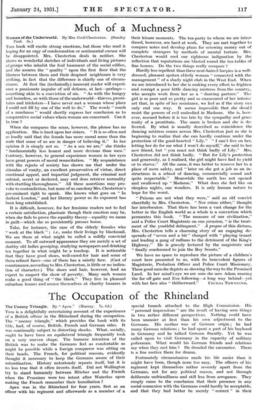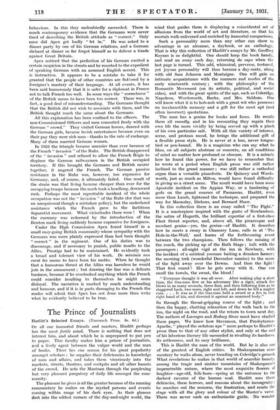The Occupation of the Rhineland
The Uneasy Triangle. By " Apex." (Murray. is. 6d.)
Tins is a delightfully entertaining account of the experiences of a British officer in the Rhineland during the occupation. The " uneasy triangle," which provides the book with its title, had, of course, British, French and German sides. It was continually subject to distorting shocks. What, socially, ought to have been an equilateral triangle frequently took on a very uneven shape. The humane intention of the British was to make the Germans feel as comfortable as might be possible while a foreign conqueror was sitting on their heads. The French, for political reasons, evidently thought it necessary to keep the Germans aware of their subordination. History notoriously- repeats itself, but it is no less true that it often inverts itself. Did not Wellington try to stand humanely between Bliicher and the French when the Prussians were too intent after Waterloo upon making the French remember, their humiliation ?
Apex was in the Rhineland for- four years, first as an officer with his regiment and afterwards as a member of a special 'branch attached to the • High Commission. His " personal impressions " are the result of having seen things in two rather different perspectives. Nothing could have been uneasier at first than his own adjustment to the Germans. His mother was of German origin ; he had many German relations ; he had spent a part of his boyhood in Germany and he talked German. fluently. Yet he was called upon to visit Germany in the capacity of military policeman. What would his German friends and relations say when they met him ? He dreaded the encounter. There is a fine motive there for drama.
Fortunately circumstances made his life easier than it might have been, though none too easy. The officers of his regiment kept themselves rather severely apart from the Germans, not for any political reason, and not through deliberate unfriendliness and still less from arrogance. They simply came to the conclusion that their presence in any social connexion with the Germans could hardly be acceptable, and that they had better be merely " correct " in their behaviour. In this they undoubtedly succeeded. There is much contemporary evidence that the Germans were never tired of describing the British attitude as " correct." Only once did Apex get badly " let in." He was asked to a dinner party by one of his German relations, and a German diehard at dinner so far forgot himself as to deliver a tirade against Great Britain.
Apex noticed that the perfection of his German excited a certain suspicion in the streets and he resorted to the expedient of speaking German with an assumed English accent. This is instructive. It appears to be a mistake to take it for granted that the people of other countries are flattered by a foreigner's mastery of their language. At all events, it has been said humorously that it is safer for a diplomat in France not to talk French too well. In some ways the " correctness " of the British seems to have been too correct. There was, in fact, a good deal of misunderstanding. The Germans thought that the British did not wish to associate with them, and the British thought much the same about the Germans.
All this explanation has been confined to the officers. The non-Commissioned Officers and men consorted freely with the German " crowd." They visited German homes, danced with the German girls, became lavish entertainers because even on their pay they were rich men—thanks to the rate of exchange. Many of them married German women.
In 1923 the triangle became uneasier than ever because of the French " invasion " of the Ruhr. The British disapproved of the " invasion " and refused to allow the French Regie to displace the German railwaymen in the British occupied territory. If this brought the Germans and British nearer together, it angered the French. The German passive resistance in the Ruhr was, however, too expensive for Germany, and, of course, it ultimately failed. One result of the strain was that living became cheaper than ever for the occupying troops because the mark took a headlong, downward
rush. Perhaps the most regrettable- incident of the whole
occupation was not the " invasion " of the Ruhr (for that was an unequivocal though a mistaken policy), but the undeclared assistance which the French gave to the factitious Separatist movement. What vicissitudes there were ! When the currency was redeemed by the introduction of the Renten mark living suddenly became expensive for foreigners.
• Under the High Commission Apex found himself in a small easy-going British conununity whose sympathy with the Germans was more plainly expressed than had been thought " correct " in the regiment. One of his duties was .to discourage, and if necessary to punish, public insults to the Allies. Prestige had to be maintained. He evidently took a broad and tolerant view of his work. De tninimis non carat lex seems to have been his motto. When he thought that a humorous thrust at the Allies was harmless he would join in the amusement ; but drawing the line was a delicate business, because if he overlooked anything which the French could consider insulting to themselves he might seem disloyal. The narrative is marked by much understanding and humour, and if it is in parts damaging to the French the reader will admit that Apex has not done more than write what he evidently believed to be true.







































 Previous page
Previous page